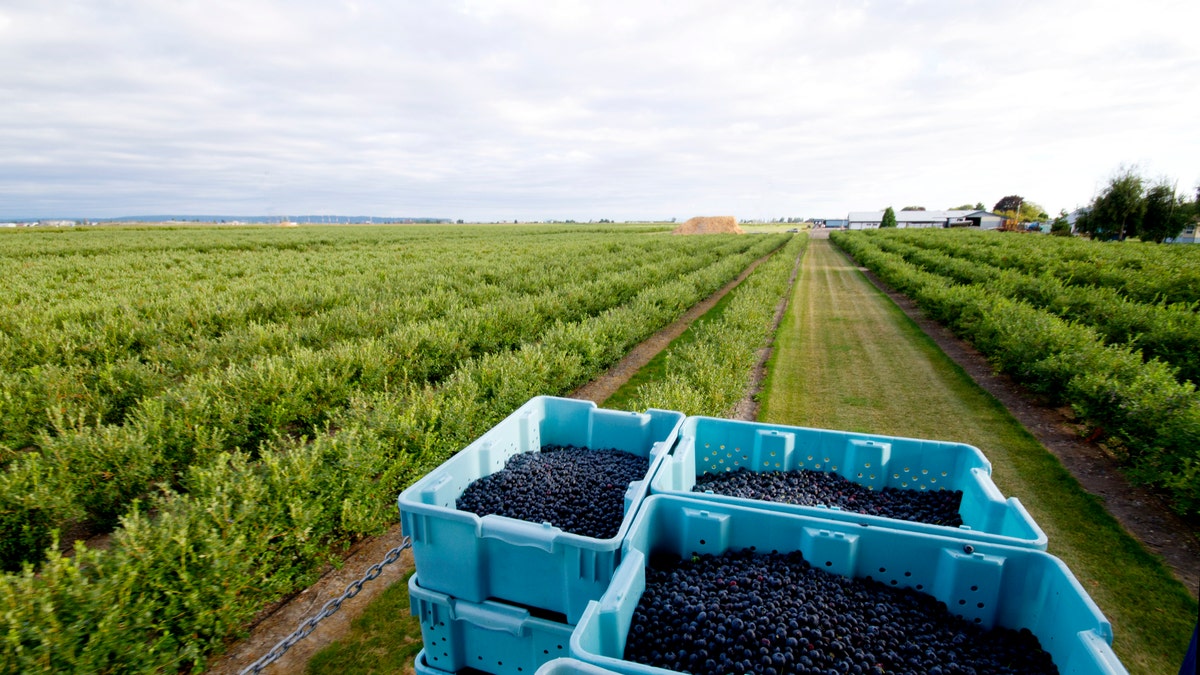Fox News Flash top headlines for August 5
Fox News Flash top headlines are here. Check out what's clicking on Foxnews.com.
A third outbreak of the novel coronavirus at a blueberry farm in Maine occurred over the past week, according to a local report. The news highlights concerns that migrant workers and residents in agricultural communities are particularly at risk for widespread infection amid the start of harvest season around the country.
Blueberry growers discovered the cases through proactive testing of seasonal workers from out of state. The number of coronavirus cases is increasing as the blueberry harvest season picks up, the Bangor Daily News reported.
The total number of confirmed cases has risen to 23. The most recent cases have been reported at Wyman’s of Maine in Milbridge, the outlet reported, citing state health officials.
HOMEMADE CORONAVIRUS FACE MASKS SHOULD BE TWO OR THREE LAYERS TO STOP SPREAD OF VIRUS, STUDY FINDS
Nirav Shah, director of the Maine Center for Disease Control and Prevention, said Tuesday that nearly 170 people have been tested.
Additional cases of the virus have been detected at two other blueberry businesses with confirmed outbreaks, per the outlet.
Ten workers tested positive for COVID-19 at Hancock Foods, while nine cases have been reported at Merrill Blueberry Farms, according to multiple reports. Maine’s WABI-TV 5 reported that Hancock County Emergency Management confirmed many of the cases are workers coming from out of state to work the season harvest.
Tony Shuman, president and CEO at Wyman’s, said the company is working along with the Maine Mobile Health Program and testing workers as they arrive this year, according to Bangor daily news.

The outbreaks are concerning amid harvest season. (iStock)
“The pre-emptive screening of these employees is working exactly as intended,” Shuman said, according to the outlet. “As soon as these cases were identified, immediate action was taken to move and isolate the individuals, and anyone traveling with them, into pre-designated quarantine locations. While quarantined, they will be provided the personal and medical care they need, through our relationship with local public health officials, and they will still receive compensation.”
The cases raise concern over the blueberry business.
“We only have one month to bring in the fruit that we’ll sell for the next 12 months, and our goal from the start has been to do so as safely and effectively as possible," Shuman said.
As the harvest season starts around the country, there is growing concern that migrant workers and residents in agricultural communities are particularly at risk for widespread infection.
In Washington State, for instance, hundreds of migrants workers reportedly travel to Okanogan County, the location of one of the largest fruit growers in the Pacific Northwest. The workers live in dormitories while they work harvesting apples, cherries, grapes, and peaches for Gebbers Farms, the Hill reported.
The county is one of the hardest-hit communities in the world by the virus and in the last two weeks, nearly 1 percent of the county has tested positive for the novel coronavirus, per the Hill.
Fears of COVID-19 outbreaks have increased as more and more migrant workers arrive and live together in close quarters, where social distancing is difficult.
BLOOD TEST IDENTIFIES WHICH CORONAVIRUS PATIENTS MAY BE HELPED OR HARMED BY STEROID TREATMENT
Early in the pandemic, meat-packing facilities in different parts of the country were affected significantly by outbreaks. Now, public health officials are concerned that new outbreaks will spread in farms and orchards that supply food to the nation.
“We are learning a lot of lessons about making sure that folks have face coverings not just on the job, but if they’re in more congregate or tight-living quarters,” Mandy Cohen, of the North Carolina Department of Health and Human Services, told the Hill. “We’re trying to get at the high-risk industries, but what happens is those folks also go home, so they bring it back to their communities.”
Other than affecting the agricultural business, there is also rising concern over the potential for increased outbreaks in these agricultural communities to overwhelm their hospital systems, the outlet noted.









































